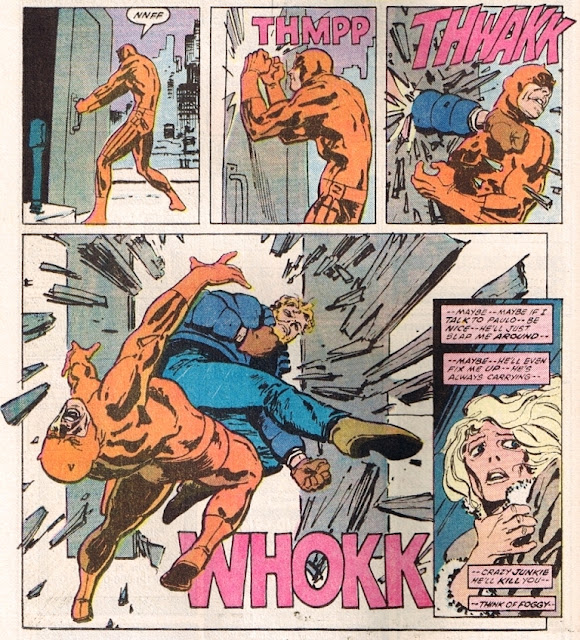The brightly colored costume has been a trope of the super hero genre since Superman’s first appearance in 1938. In fact the long johns have defined the entire genre so much so that the publishers wouldn’t publish an issue that didn’t have them wearing the brightly colored skivvies after all, what’s a Superman comic without Superman? On the other hand, to non comic enthusiasts it’s the costumes that make superhero comics so childish and so silly.
So, in 1986, when Frank Miller wrote a story where Daredevil
is fighting crime without a costume, he is breaking a long standing tradition
and publishing rule. But then again, he is Frank Miller. He revitalized the
whole of the mainstream American comics industry with his groundbreaking work
on Daredevil in the early 80’s, he can do pretty much what he wants.
 |
| The iconic Daredevil 168, Jan 1981, on Miller's first writing job he creates the phenomenal character of Elektra. |
Frank Miller had made a rep as a young hot shot who could
not only draw as good or better than anyone, he could write too, and much
better than anyone else in the industry at the time. With his first written story, Daredevil
168, the origin of Elektra, he blew everyone away with it’s deep emotional
resonance. And he kept blowing people away month after month for the whole of
his 23 issue run of writing and drawing Daredevil from issue #168 (1/81) to #191
(2/83).
 |
| Daredevil 191, Feb. 1983 |
Fast forward three years to 1986. David Mazzucchelli is quietly
kicking ass with his amazing art work on Daredevil for the last two years. He and
writer Denney O’Neil are continuing Miller’s lead of making Daredevil moody and
gritty. They have his girlfriend commit suicide and have his law practice going
down the tubs.
Mazzucchelli is bringing a realism to the comic that is rare in
the world of superhero. It is well researched art and very un-formulaic.
Mazzucchelli chooses fresh and fluid figure work over the easy to reproduce
stock poses that are common in superhero comics. He does research and actually
uses photo references for his rich backgrounds. This is no small feat when you
consider that he has to produce 22 pages of this every 30 days plus a cover.
And he often inked his own work as well.
 |
| Daredevil 221, DD goes to Venice to destroy a crime syndicate and Mazzucchelli has the opportunity to draw incredible Venetian architecture. |
Suddenly Frank Miller shows up again. He wants to come back
to where he left off 3 years ago. With Murdock’s love dead and his law practice
falling apart, where could he go? Where else? Kingpin learns his secret
identity! And like a smart villain (that only Miller can write) he ruins Matt
Murdock’s life in secret.
Matt’s mortgage is not paid for the last three
months; His electricity gets shut off; and he is being accused of paying a
witness to lie about a case. Matt’s life descends to the point where he
questions his own sanity.
He hits rock bottom. But at the last minute, just when you think it’s all over for him, in classic comic book fashion, he is… Reborn.
He hits rock bottom. But at the last minute, just when you think it’s all over for him, in classic comic book fashion, he is… Reborn.
In the climatic issue #231, King Pin has got a lunatic
serial killer running around in Daredevil’s long johns to sully Daredevil’s name. Murdock
knows about it and is on it. In classic Freudian tradition Matt Murdock has to
fight himself.
 |
| In order to incriminate Daredevil, King Pin has arranged to get a psychotic guy running around killing people in Daredevil's costume, but Matt Murdock is having none of it. |
There is something really thrilling seeing Murdock in his
civilian identity fighting his alter ego. Stripped of his costume, the symbol
of his identity or ego, his soul laid bare.
There is more mystery and power in
this one scene than all of Daredevil's previous appearances. It transcends the genre.
Suddenly you are not reading a superhero comic any more, suddenly you are
reading a story about a simple guy who is fighting for his life. This is the
story of a guy fighting the system. This could be the story of you or I.










Luin tämän viestin täysin koskien uusimman ja edellisen teknologian yhdennäköisyyttä, se on hämmästyttävä artikkeli.
ReplyDelete